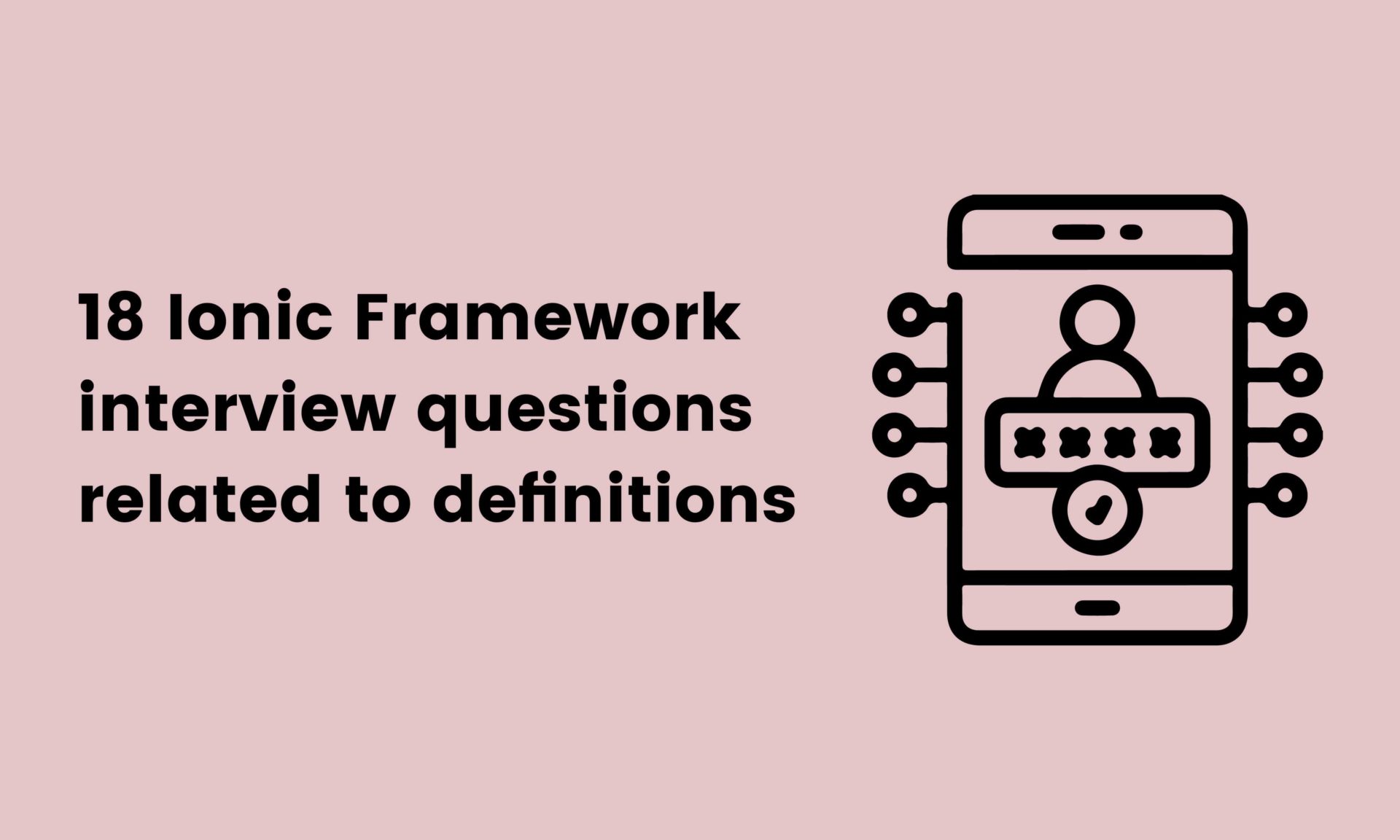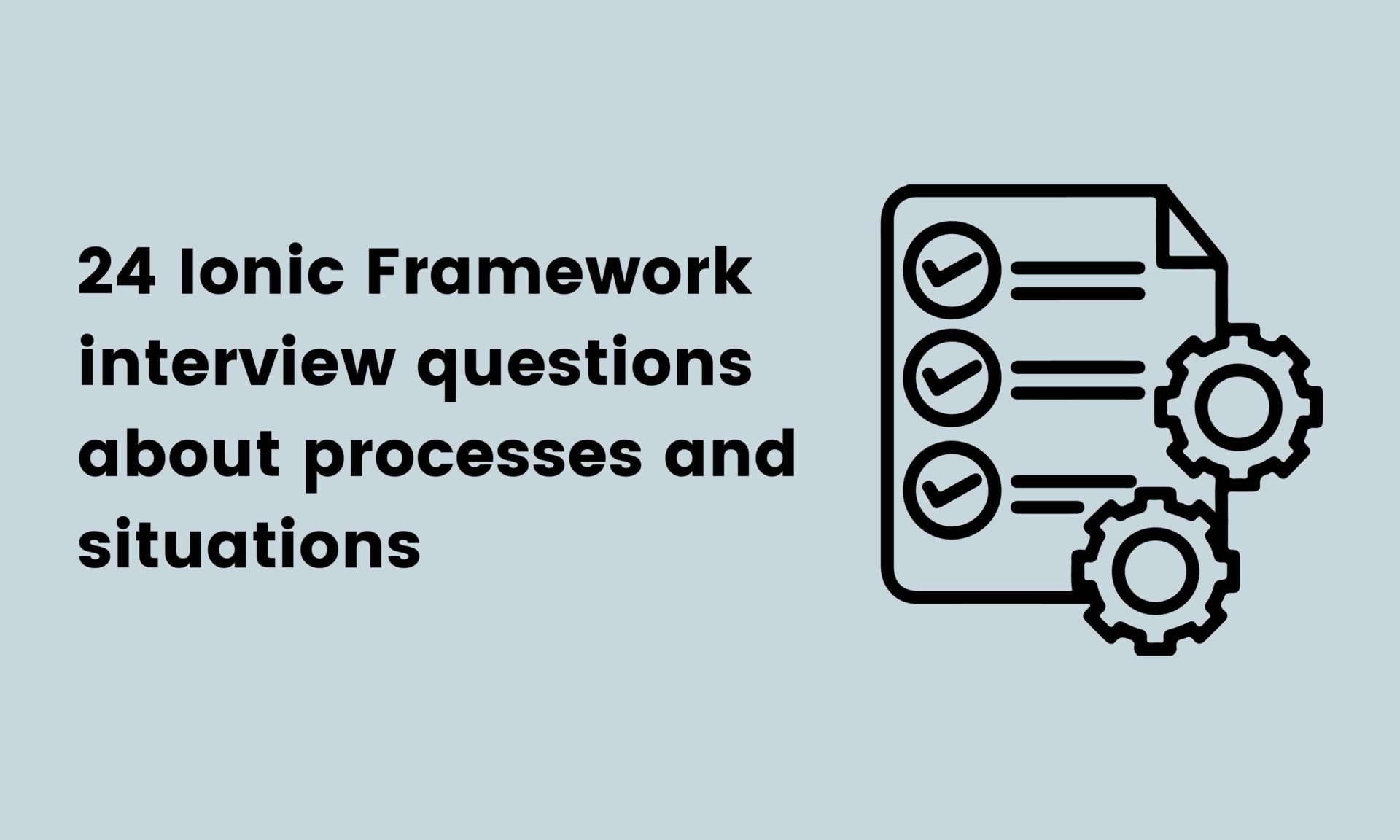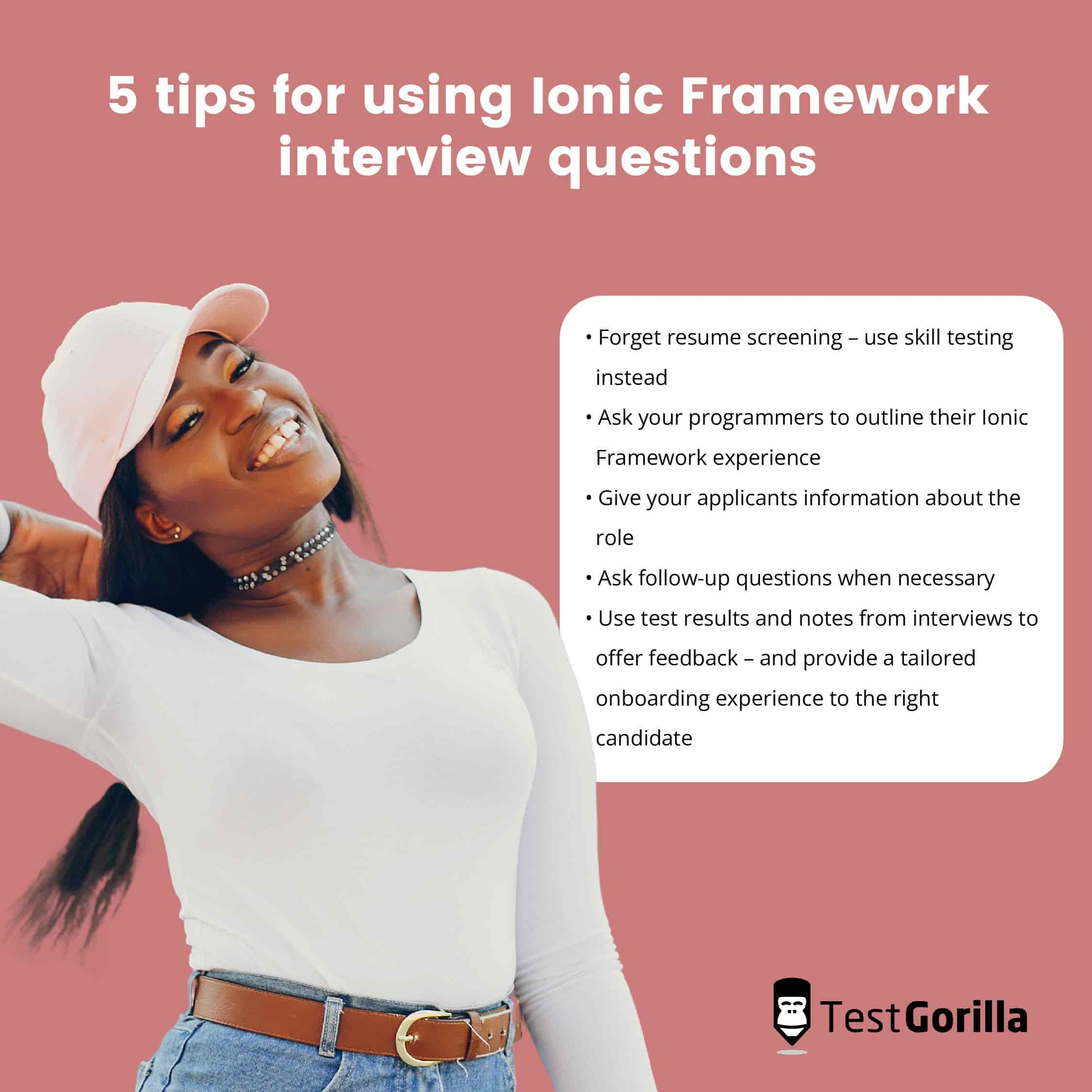55 Ionic Framework interview questions to ask programmers
Are you looking for a new Ionic Framework expert to join your team?
The right person will need to have cross-platform and Ionic Framework skills, along with strong soft skills, which is why finding the right programmer can be challenging.
There are ways to make it easier to hire professionals who are proficient in Ionic framework, though. You can start with a skills assessment to thoroughly evaluate the skills of your programmers at the earliest possible opportunity. Then, you can invite the best candidates to an interview to further assess their soft skills and knowledge.
If you don’t have a list of questions to ask prospective employees, you’ve come to the right place.
In this article, you’ll find a comprehensive list of Ionic Framework interview questions you need to hire the right programmer.
Table of contents
- 13 general Ionic Framework interview questions
- 5 general Ionic Framework interview questions and answers
- 18 Ionic Framework interview questions related to definitions
- 5 Ionic Framework interview questions and answers about definitions
- 24 Ionic Framework interview questions about processes and situations
- 5 Ionic Framework interview questions and answers about processes and situations
- 5 tips for using Ionic Framework interview questions
- Find and evaluate programmers using the right Ionic Framework interview questions
13 general Ionic Framework interview questions
Ask your applicants some of the 13 general Ionic Framework interview questions listed in this section to get an idea of their general knowledge.
Explain what Ionic Framework is.
Which four skills do developers need to use Ionic Framework?
Which four soft skills do developers need to use Ionic Framework?
Which skills do you need to improve?
Which three things are important for installing Ionic Framework?
Outline four advantages of using Ionic.
Outline three disadvantages of using Ionic Framework.
List some of the main features of Ionic Framework.
Explain how Ionic 4 differs from its previous versions.
Name five storage types that Ionic Framework offers.
How does the size attribute affect the columns used in an ion-grid component?
Give some examples of good IDEs for Ionic mobile app development.
Is it possible to use Firebase with Ionic Framework?
5 general Ionic Framework interview questions and answers
Below, you’ll see sample answers to five of the general Ionic Framework interview questions. Use them to assess your applicants’ knowledge and understanding of the basics of Ionic.
1. Which four skills do developers need to use Ionic Framework?
Four important skills that developers need to use Ionic Framework include Angular, JavaScript, HTML, and CSS. Look for signs that your applicants already have these skills and understand how they relate to the Ionic Framework.
2. Which four soft skills do developers need to use Ionic Framework?
Applicants might give different answers here, but four important skills required to use Ionic Framework include communication, problem-solving, attention to detail, and time-management skills. Consider applicants who understand why these skills are important – or give examples of other skills relevant to your role.
3. Which skills do you need to improve?
Your applicants may lack time-management skills, or they might say that they get too caught up in details. They may lack the technical JavaScript skills required to use the Ionic Framework successfully. No matter their weaknesses, consider applicants who are actively working on improving their skills.
4. Outline four advantages of using Ionic.
Some of the key advantages of Ionic are that the framework:
Has an easy and accessible documentation
Is easy to learn
Is built on AngularJS
Makes cross-platform app development easy
5. Outline three disadvantages of using Ionic Framework.
There are disadvantages to using Ionic. Applicants might say that:
Ionic has native plugins that are not always stable
It’s challenging to debug an app built using Ionic Framework
Programmers can’t use the Ionic Framework to create 3D games because it only uses CSS
The best insights on HR and recruitment, delivered to your inbox.
Biweekly updates. No spam. Unsubscribe any time.
18 Ionic Framework interview questions related to definitions
Ask your interviewees some of these 18 Ionic Framework interview questions related to definitions to get a more in-depth understanding of their knowledge.
Explain what the Ionic CLI is.
Explain what a life-cycle hook is.
Explain what an Event is in Ionic Framework.
Explain what Ionic Market is.
Explain what an ion-alert is.
Explain what ion buttons are.
Explain what the ion-content element is.
Explain what an ion-list is.
Explain what an ion-input component is.
Explain what a progressive web app is.
Explain what is.
Explain what native apps are.
Explain what Mobile Web apps are.
Explain what Hybrid apps are.
Explain what grids are in ion-grid components.
Explain what rows are in ion-grid components.
Explain what a web view is.
Explain what CORS is.
5 Ionic Framework interview questions and answers about definitions
Here are our sample answers to five of the Ionic Framework interview questions related to definitions. Use them to gauge your applicants’ technical knowledge and skills.
1. Explain what the Ionic CLI is.
Applicants should know that the Ionic CLI refers to the Ionic Command Line Interface. This tool is critical for developing apps in Ionic using Angular.
Your applicants should also know that the Ionic Command Line Interface provides programmers with many other tools to help them develop applications.
2. Explain what an ion-alert is.
Can your candidates explain that an ion-alert is a type of dialog that gives the user notice when they need to take action, along with crucial information to help them understand the issue?
Are they aware that ion-alerts are located at the top of the application and that users can dismiss an alert manually and then resume using the app?
3. Explain what ion-buttons are.
Do your applicants know that ion-buttons help users interact with applications and navigate through them? Can they explain that buttons can feature two sets of information, icons, or texts (or both) and that the buttons convey information about resulting actions if users click them?
4. Explain what the ion-content element is.
Your applicants should be aware that the ion-content element acts as a container. They may explain that programmers can customize it with CSS and use it to wrap the elements they choose to create the application.
5. Explain what an ion-list is.
Programmers use ion-list elements to display different types of information, including text and toggles, thumbnails, and icons. Applicants should know that these lists support multiple interactions, such as deleting and swiping items.
24 Ionic Framework interview questions about processes and situations
Ask your candidates some of these 24 Ionic Framework interview questions about processes and situations to learn more about their knowledge and technical skills with Ionic.
Explain what ngOnInit is and what it does.
Explain what ngOnDestroy is and what it does.
Explain what ionViewWillEnter is and what it does.
Explain what ionViewDidEnter is and what it does.
Explain what ionViewWillLeave is and what it does.
Explain what ionViewDidLeave is and what it does.
Explain what ionNavDidChange is and what it does.
Explain what ionNavWillChange is and what it does.
Explain what ionNavWillLoad is and what it does.
Which debugging method would you use if testing apps on real devices?
In which situation would you use config.xml?
In which situation would you use the Alert Controller?
Explain what async does.
Explain what await does.
Explain what the capacitor does in the Ionic Framework.
What does ionic start –list do?
Explain what ion-infinite-scroll does.
In which situation would you use the ?
Which method would you use to rename Ionic apps?
Which method would you use to update a Cordova plugin?
What does the RouterModule do in Ionic 4?
Which method would you use to handle CORS?
What method would you use to save data within Ionic apps?
Which method would you use to reduce the size of an Ionic app?
5 Ionic Framework interview questions and answers about processes and situations
Here are the answers to five of the Ionic Framework interview questions about processes and situations. Use them as a guide when evaluating your applicants’ responses.
1. In which situation would you use the ?
Can your programmers explain that the component enables them to use pull-to-refresh? Can they explain that refreshing displayed pages will enable the user to view the most recent content, and are they aware that calling on the complete() function is required when the refreshing page process has ended?
2. What does RouterModule do in Ionic 4?
Do your applicants know that RouterModule provides an easy way to implement navigation in an Ionic4 application? Can they explain that it offers a consistent routing method for the entire app?
3. Explain what the capacitor does in Ionic Framework.
The capacitor app facilitates web app creation specifically for apps that run on iOS, Electron, Android, and the web. App creation using the capacitor works with one code base.
4. What method would you use to save data within Ionic apps?
Applicants should be aware that the @ionic/storage package facilitates data saving.
Can they explain that the module enables programmers to store JSON objects and value pairs securely? Can they also explain that there are several storage engines to choose from depending on the platform, such as SQLite, IndexedDB, and WebSQL?
5. Which method would you use to reduce the size of an Ionic app?
There are a few steps that programmers can use to reduce the size of an Ionic app, such as:
Compress screenshots
Delete unneeded icons
Minify CSS and JS files
Remove unneeded external modules
Run the iconic build android -prod command
5 tips for using Ionic Framework interview questions
1. Forget resume screening – use skills testing instead
Resume screening is not an obligatory step in the hiring process. There’s no need to screen resumes if you choose to use skill testing, which is much faster and more objective.
When using skills testing, send an assessment to candidates as soon as you receive their applications. Waiting until you’ve interviewed an applicant will slow down your hiring process, which can be counterproductive.
Remember to feature an Ionic Framework test in the assessment, along with other role-specific tests. You can even use a Culture Add test to evaluate cultural alignment or other personality and culture tests.
2. Ask your programmers to outline their Ionic Framework experience
Get a general idea of your programmers’ Ionic Framework experience before you ask them more complex interview questions.
This approach will give you an idea of their general knowledge, help you to see if their experience and skills align with your business’s goals, and also put them at ease.
3. Give your applicants information about the role
After you ask your applicants to describe their Ionic Framework experience, give them information about your open role. Explain what your business uses Ionic for and give them information about the work of your team and some of your next key goals.
4. Ask follow-up questions when necessary
When you receive short answers, don’t be afraid to ask follow-up questions. This method will help you determine whether your candidate is just nervous or doesn’t have the knowledge required for your open role.
For example, if you ask your programmers a question about reducing the size of Ionic apps and they only list two methods for doing so, you may ask, “Are there any other methods that can help make an app lighter?”
5. Use test results and notes from interviews to offer feedback – and provide a tailored onboarding experience to the right candidate
After you make a hiring decision, let other candidates know that you haven’t retained their applications. You can use your interview notes and test results to offer feedback to unsuccessful applicants.
As for your new hire, you can begin onboarding them and get them started on small projects. Use their test and interview results to tailor the onboarding process to their needs – this will help them get up to speed and start contributing to the team faster.
If you need help with the onboarding process, you can use an onboarding checklist to ensure you’re not forgetting anything.
Find and evaluate programmers using the right Ionic Framework interview questions
Finding knowledgeable programmers who are proficient with Ionic Framework and with Angular can be difficult, and there are various skills you have to evaluate.
The best way to do this is to integrate skills assessments into your hiring process and then interview your best applicants, using some of the Ionic Framework interview questions from this article.
For the best results, remember to include our Ionic Framework test in your assessment – and check out TestGorilla’s test library to see which other tests to include.
Use these methods to simplify the hiring process and find developers faster – and get rid of the lengthy resume screening process once and for all. Get started for free today.
You've scrolled this far
Why not try TestGorilla for free, and see what happens when you put skills first.


















